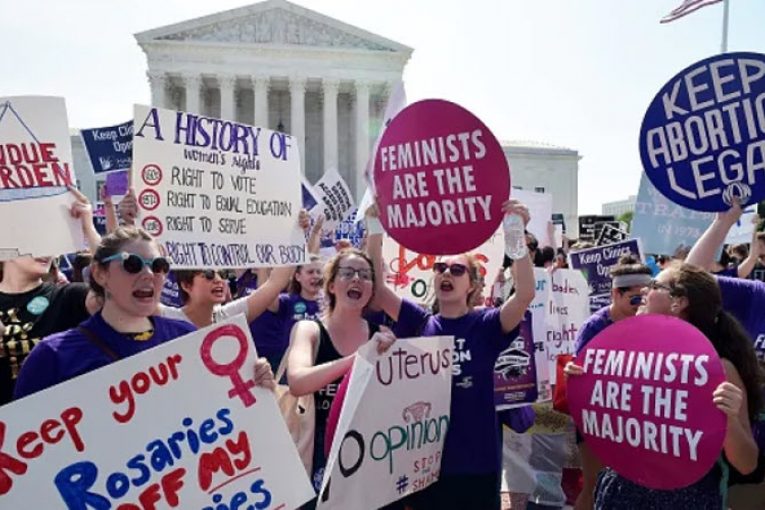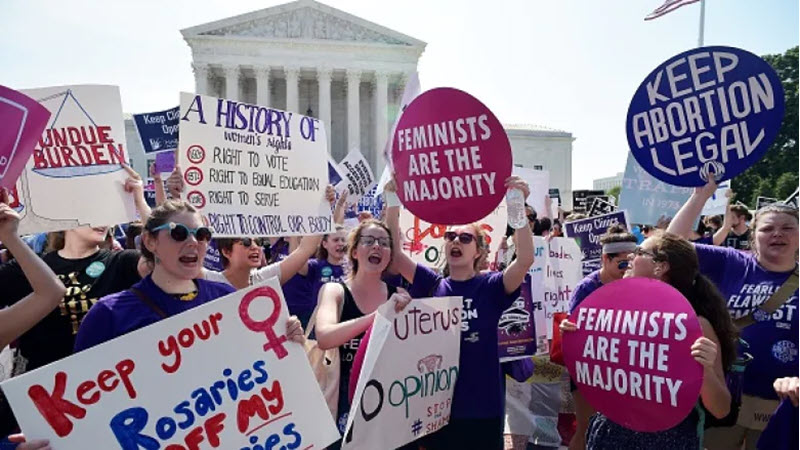

By Catherine Hamilton
WASHINGTON, DC – The Supreme Court declined to block the Texas abortion ban Friday, though the court will hear two cases challenging the bill Nov. 1. Since the ban took effect Sept. 1, next to no abortions have been carried out in the state.
The two cases that the court will hear oral arguments on are United States v. Texas, a lawsuit filed by the U.S. Department of Justice, and Whole Woman’s Health v. Jackson, a lawsuit filed by a large coalition of Texas abortion providers, doctors, and abortion fund organizations.
In United States, the court will decide whether or not to block SB 8, and whether or not the DOJ has legal authority to challenge the law. In Whole Woman’s Health, the court will be ruling on if federal courts have the ability to block the Texas abortion ban.
The court will also hear an argument this term from the state of Mississippi asking the court to overturn Roe v. Wade and allow the state to uphold their abortion ban after 15 weeks.
Additionally, it will decide if Kentucky Attorney General Daniel Cameron can revive an abortion ban that has been declared unconstitutional by two lower-level courts.
Following the court’s ruling Oct. 22, Justice Sonia Sotomayor quickly released an opinion on the decision not to block the ban immediately, arguing:
“I cannot capture the totality of this harm in these pages. But as these excerpts illustrate, the State (empowered by this Court’s inaction) has so thoroughly chilled the exercise of the right recognized in Roe as to nearly suspend it within its borders and strain access to it in other States. The State’s gambit has  worked. The impact is catastrophic.”
worked. The impact is catastrophic.”
Her full statement can be found in full here.
SB 8 bans abortions after six weeks of a pregnancy, which is before many even realize they are pregnant. It also has created a so-called “vigilante system” that makes it hard to challenge in a court when Roe v. Wade is still in effect.
Rather than law enforcement implementing the ban, SB 8 encourages the general public to sue any person who has aided the abortion receiver in any way. This can include the abortion provider, health care workers, or even a driver to the clinic.
If their lawsuit is successful, the person who sued can receive at least $10,000 from the person they sued. Clinics in other states have reported an increase in Texans asking for the services. Two-thirds of the calls one Oklahoma clinic has received since the law took effect have been from Texans.
U.S. Attorney General Merrick Garland has said the ban is “an attempt to nullify the Constitution.”
The coalition of plaintiffs in Whole Woman’s Health are represented by the Center for Reproductive Rights, Planned Parenthood Federation of America, the Lawyering Project, the American Civil Liberties Union, the ACLU of Texas, and Morrison and Foerster LLP.
The defendants include state court trial judges and county clerks in Texas, the Texas Medical Board, the Texas Board of Nursing, the Texas Board of Pharmacy, the Texas attorney general, director of Right to Life East Texas.
Many of the plaintiffs representing Whole Woman’s Health have come out with statements on the ban.
Bridgette Amiri, Deputy of the ACLU Reproductive Freedom Project, released this statement:
“By refusing once again to block Texas’ horrific abortion ban, the Supreme Court is sending an alarming signal that it will stand idly by while our reproductive rights are violated, a reality Texans are too familiar with after living under the nation’s most extreme abortion ban for nearly two months. We hope that after the court hears the case on Nov. 1, that it will act immediately to correct its earlier mistake, and will issue a decision that restores abortion access in Texas.
“This cruel law has had devastating consequences, with the impact hitting marginalized communities the hardest. This is a dire moment, and we’ll do everything in our power to fight back against attacks on our reproductive rights before it’s too late.”
And Amy Hagstrom Miller, president and CEO of Whole Woman’s Health and Whole Woman’s Health Alliance, stated:
“Texans deserved better than this. The legal limbo is excruciating for both patients and our clinic staff. Lack of access to safe abortion care is harming our families and communities and will have lasting effects on Texas for decades to come. We’ve had to turn hundreds of patients away since this ban took effect, and this ruling means we’ll have to keep denying patients the abortion care that they need and deserve.
“The Supreme Court has said that abortion is protected by our Constitution, yet they are allowing Texans to be deprived of their rights. To all the Texans who are with us, who have been speaking up, and to those who may need abortion care, let us be clear: just as we have been in the past, Whole Woman’s Health is here for you, and we are here for the long haul.”
Nancy Northup, president and CEO of the Center for Reproductive Rights, stated:
“The Supreme Court’s action today brings us one step closer to the restoration of Texans’ constitutional rights and an end to the havoc and heartache of this ban. We are enormously disappointed that the Court has left the law in effect for now, forcing those with means to leave the state to access constitutionally protected abortion services and leaving others with no options at all. However, we are confident that when the Court ultimately rules in these cases, it will reject the state of Texas’ cynical ploy to enact a brazenly unconstitutional abortion ban.”
Alexis McGill Johnson, president and CEO, Planned Parenthood Federation of America, opined:
“SB 8 is a heinous and blatantly unconstitutional abortion ban that never should have been allowed to take effect—and it’s devastating that it remains in place. For nearly two months, we’ve seen the catastrophic impact of SB 8 in Texas and beyond. Patients who have the means have fled the state, traveling hundreds of miles to access basic care, and those without means have been forced to carry pregnancies against their will. Every day SB 8 is in place is one more day of cruelty, and it cannot stand. We look forward to our patients and providers finally having their day in court on November 1, when the Supreme Court will hear the cases. And we are hopeful the Court will step in and block SB 8 from continuing to wreak havoc.”

